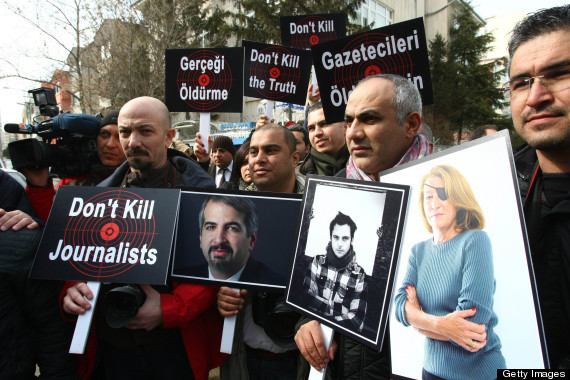Syria has, understandably, been a top point in the news lately as conflict continues to rage. Indeed, I’ve written quite a few posts on Syria in the past, and could continue to write about the country for some time while only barely scratching the surface of the issues. A quick Google search for news in Syria turns up with hundreds of articles  just written in the past week or so on a variety of topics: continued calls for ceasefire, airstrikes in Damascus, possible polio outbreaks, and the death of a top military officer, to name just a few. But in all the noise about Syria, how accurate is the information we have about what’s happening on the ground?
just written in the past week or so on a variety of topics: continued calls for ceasefire, airstrikes in Damascus, possible polio outbreaks, and the death of a top military officer, to name just a few. But in all the noise about Syria, how accurate is the information we have about what’s happening on the ground?
Journalists have a variety of techniques for reporting in conflict zones. Secure browsers like Tor allow journalists and dissidents to send information despite hostile governments, the UN and other organizations work to protect journalists, and protection for journalists and other media personnel does exist under international law. Reporting in a conflict zone is, however, an extremely dangerous task, particularly in Syria. You may recall from a little over a year ago when journalist Marie Colvin, a veteran at reporting from conflicted areas, and photographer Remi Ochlik were killed during a shelling in Syria, which resulted in an international uproar. Earlier this year, on the anniversary of their deaths, the campaign A Day Without News? was launched to raise awareness of the dangers that journalists face in areas like Syria, and announced that this past year has been the deadliest year for journalists in war-torn areas, with 90 reporters having been killed. Overall, according to the Doha Centre for Media Freedom, at least 116 journalists have been killed since the conflict began in 2011.
Conditions for reporters in Syria haven’t improved in the intervening months, unfortunately. Not only do journalists in Syria face the danger of being hit by gunfire or shelling, they also have to worry about being kidnapped. Reporters Without Borders has announced that at least 16 foreign and 60 local journalists are currently missing, with many more cases potentially unreported. Indeed, many rebel groups are actively being encouraged to snatch foreign journalists, who are often accused of being spies. As a result, many reporters have stopped entering rebel-held territories, and some newspapers, like the Sunday Times, have requested that people stop sending in photographs from Syria in order to discourage risk-taking.
 This is, of course, beneficial for war correspondents, as, naturally, they are considerably safer if they do not venture into dangerous areas. But what does this mean for news from Syria? Voluntary news blackouts have become quite common, and reporters who do go into dangerous areas typically only stay long enough to get just as much information as they need. Therefore the information coming out of Syria is a bit spotty at best, and quite biased towards the relatively calm capital of Damascus.
This is, of course, beneficial for war correspondents, as, naturally, they are considerably safer if they do not venture into dangerous areas. But what does this mean for news from Syria? Voluntary news blackouts have become quite common, and reporters who do go into dangerous areas typically only stay long enough to get just as much information as they need. Therefore the information coming out of Syria is a bit spotty at best, and quite biased towards the relatively calm capital of Damascus.
This has created an opening for untrained civilians and activists to act as journalists, sending in photos, videos, and information to the major news outlets. It is difficult to verify these stories, however. Common sense would suggest that people are not fabricating the tragedies they send in, but in fact multiple videos and photographs purporting to be of troubles in Syria have been debunked as images from other years and even countries that are instead being used as propaganda. We may never know the truth of the situation in Syria, if foreign journalists are forced to remain on the sidelines and untrained civilians send in unverifiable information. Not having a clear view of the situation will certainly shape views of the conflict, both for the general public and for international leaders.
What is your opinion of the situation for journalists and civilian reporters and how the lack of accurate information shapes public perception and policies? Let me know in the comments!


